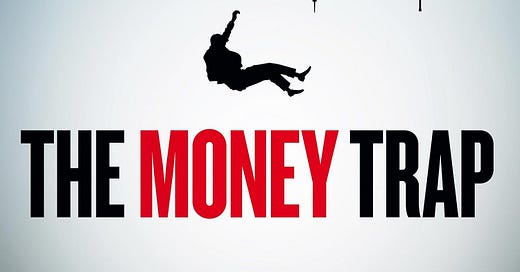I just read Alok Sama’s book The Money Trap.
It’s brilliant.
It has the narrative quality of well-written fiction and the rigor of a good essay. If there’s one book you should finish by the end of this year, it’s this one.
A total banger!
The book has a certain depth that comes only from someone who’s lived a rich life — and not just money-rich.
It reminded me of Andrew Ross Sorkin's Too Big to Fail because it is similar in style and a bit in substance. Sorkin's book would have been a little tougher to pull off since he’s an outsider. Access and sourcing would have been harder. Mr Sama is an insider and it’s his own story. So better access and sourcing, obviously.
The author gives you a rare, insider’s view of what happens in high finance, investment banking, the amazing world of Masayoshi Son, Nikesh Arora, and frenzied deal-making.
The book is beautifully written and captures fine details. It's masterful in its execution of the devices that great writers use. For example, there’s a chapter where Mr Sama describes his first big meeting with Mr Son.
The story progresses around the meeting, but he throws in an open question at the start — a side quest! These aren’t essential to progress but add depth to the narrative. So here’s how it goes (I’m paraphrasing):
As he walks into the conference room in a Tokyo hotel, he notices the elevator skips from floor 26 to 28—there's no 27th floor. He asks the receptionist, who doesn’t know the reason. He asks Mr Son’s chief of staff. He doesn’t know either.
The meeting goes on. Mr Sama and Mr Son hit it off.
Towards the end of the chapter, as Mr Sama is leaving, Mr Son’s chief of staff finds him and explains the mystery: the 27th floor doesn’t exist because it’s a double-height space, combining two floors.
This detail is not necessary for the main story but adds richness to the narrative. It’s a clever trick writers use — drive a few of these at the beginning of a chapter and address them towards the end.
It is the kind of narrative quality you don’t see in the usual startup or VC books which are often ghostwritten and formulaic. The Money Trap is leagues ahead of everything I’ve read this year on startups and high finance. If I’ve read five or six startup/VC books this year, with an average rating of around 3.5 or 4, this book is a clear 9.
It’s also grounded in the inner monologue of someone in high finance—someone who makes a lot of money but wrestles with contentment and harbors a complex relationship with their career.



